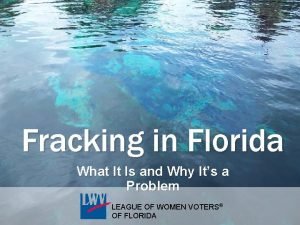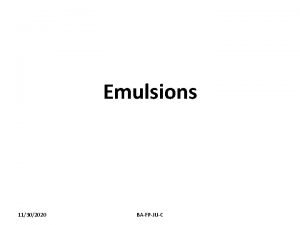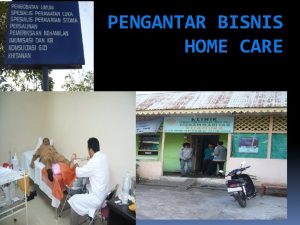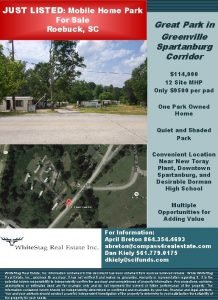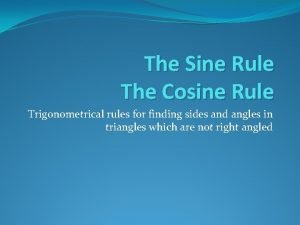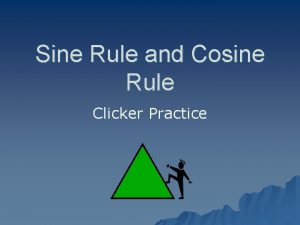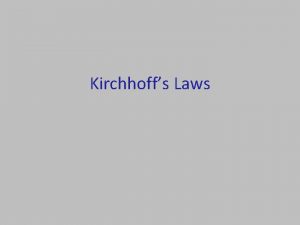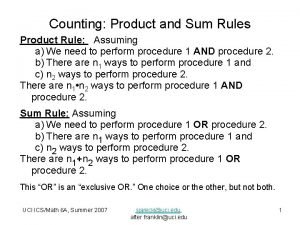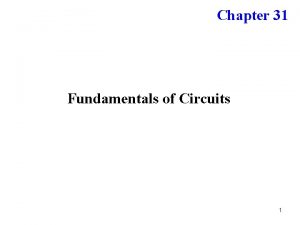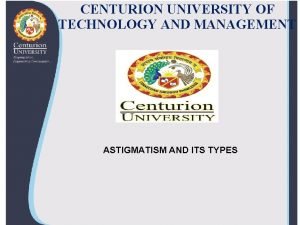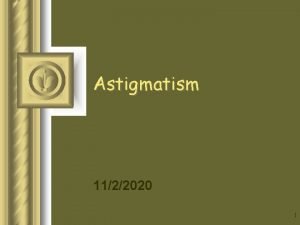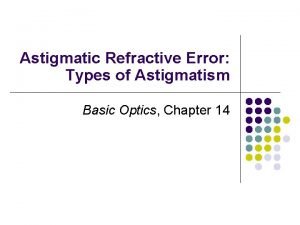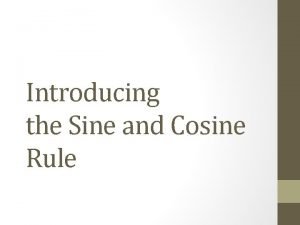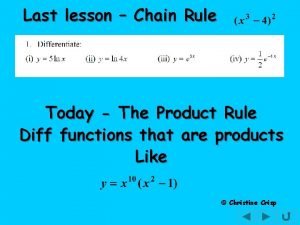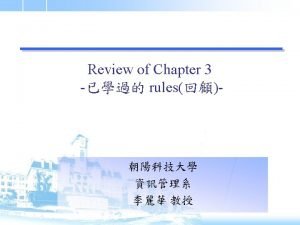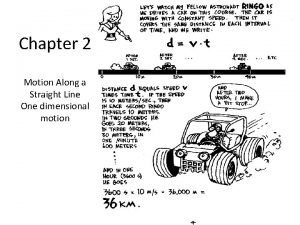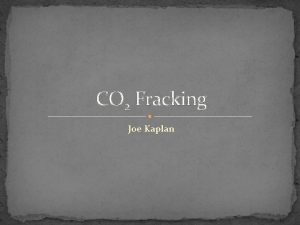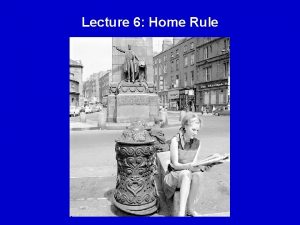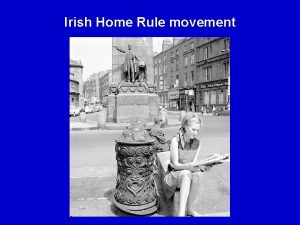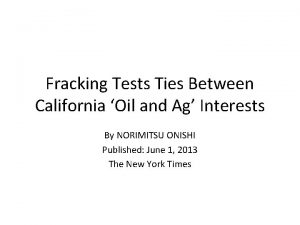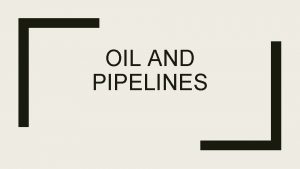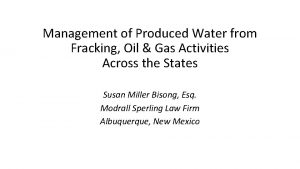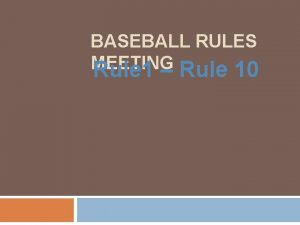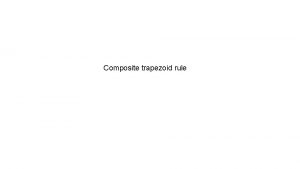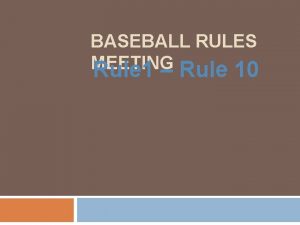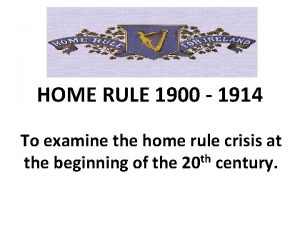Colorado home rule and fracking Colorado oil and

































- Slides: 33

Colorado home rule and fracking

Colorado oil and gas regulation Previous speakers have described regulatory systems governed by the Colorado Oil and Gas Conservation Commission (COGCC) and other state and federal regulators. My subject is Colorado’s allocation of power over oil and gas between state and local governments and proposals to shift more authority to local governments.

Colorado’s oil and gas basins (blue)

Well permits granted by COGCC

Colorado home rule Home rule is shorthand for powers of local governments. The background doctrine from the 19 th Century, called Dillon’s Rule, limits local powers to those clearly delegated by state legislatures, augmented by a handful of specific guarantees in state constitutions.

Colorado home rule Dillon’s Rule was Colorado law everywhere until a 1902 constitutional amendment granted a degree of independence to Denver and offered it to other cities. Amendments expanded its scope and made it available to all municipal governments. Colo. Const. Art. XX. 98 Colorado municipalities have home rule, including all sizeable cities.

Colorado home rule Dillon’s Rule continues to apply to municipalities that have not adopted a home rule charter, commonly called statutory cities and towns. There are 172 statutory municipalities, none very large.

Colorado home rule Dillon’s Rule continued to govern county powers until a 1970 amendment authorized county home rule. Colo. Const. Art. XIV § 16. Only two counties (Weld and Pitkin) have adopted home rule, and neither has contested state control in any important matter. Dillon’s Rule continues to govern the other 60 counties.

Colorado home rule Denver and Broomfield are combined city-county governments with home rule. Denver has an extensive record of independence from state control in both city and county matters. Therefore it is likely that home-rule counties have powers similar to those of home-rule municipalities with regard to fracking disputes.

Colorado home rule Art. XX’s definitions of home-rule powers are far from clear, so the Colorado Supreme Court has worked out governing rules. After some confusion and false starts, the Court began to adopt its current structure in 1961. Governmental powers are divided into three classes: local, statewide, and mixed.

Colorado home rule If a power is classified as local, a municipal law trumps a conflicting state law. If a power is classified as mixed, a state law trumps a conflicting municipal law. If a power is classified as statewide, municipalities cannot act regardless of a conflict.

Colorado home rule Most legal contests over home rule are about whether a power is local or mixed, and if mixed, whether state and local laws conflict. The scheme resembles in many ways the relationship between federal and state laws. On the conflict question, Colorado courts have adopted the standard federal term, preemption. As in federal cases, preemption can be express or implied.

Colorado home rule In 1990 the Colorado Supreme Court adopted a four-part test to determine whether a power is local or mixed: 1. Need for statewide uniformity. 2. Extraterritorial effects. 3. Traditional practice. 4. Specific allocation in the Colorado Constitution. Aspects of the list are odd, and it is likely incomplete. Other states add a distinction between municipal operations and private market regulation.

Board of County Comm'rs v. Bowen/Edwards Assoc. , 830 P. 2 d 1045 (Colo. 1992) In 1988 La Plata County adopted regulations governing oil and gas development, mainly to mitigate conflicts between severed surface and sub-surface owners. Bowen/Edwards sued La Plata County to challenge its regulations, claiming preemption by the state’s Oil and Gas Conservation Act (OGCA).

Board of County Comm'rs v. Bowen/Edwards Assoc. , 830 P. 2 d 1045 (Colo. 1992) The Supreme Court rejected the claim. It held that the County’s broad power over land use regulation delegated by state statutes included the claimed authority, satisfying Dillon’s Rule. It further held that OGCA was not intended to occupy the field of oil and gas regulation. It remanded to give the company the chance to identify particular conflicts, if any.

Voss v. Lundvall Bros. , 830 P. 2 d 1061 (Colo. 1992) In 1985 Greeley voters initiated and passed an ordinance forbidding oil and gas drilling or extraction within the city. The city council passed a nearly identical ordinance. Lundvall Bros. had drilling permits that the ordinances would have invalidated. Its lawsuit claimed that state law (OGCA) preempted the ordinances.

Voss v. Lundvall Bros. , 830 P. 2 d 1061 (Colo. 1992) The Supreme Court applied its four-factor test to decide that power to forbid oil and gas drilling and extraction is mixed rather than local. An important basis was the fact that oil or gas pools can extend across city boundaries, and unitization was a major purpose of the state law.

Voss v. Lundvall Bros. , 830 P. 2 d 1061 (Colo. 1992) The Court decided that, although Greeley’s authority to regulate was not totally preempted, its attempt to impose a total ban conflicted with state law and was thus invalid. The doctrine of the Voss and Bowen/Edwards cases is that local governments can regulate, but state law preempts any conflicting local rule.

New fracking bans and moratoria Longmont and Lafayette have banned fracking. Broomfield, Ft. Collins, and Boulder County have passed moratoria. Loveland will vote on July 24. All but the County have home-rule charters. Activists have begun to seek a home-rule charter for Boulder County; they plan a fracking ban in the charter.

Fracking bans and moratoria All but the County: (1) adopted measures by initiative, which complicates any attempt to compromise; (2) have been sued by the Colorado Oil and Gas Association (COGA), a trade group. The bans are very likely to lose based on Voss. The moratoria might survive for a short period, but long ones are also likely to lose.

Fracking amendments and propositions Numerous drafts of state ballot initiatives have been filed and processed. None has yet obtained needed signatures on petitions to make it to the ballot. Governor Hickenlooper has tried to negotiate a compromise ballot measure for legislative adoption, so far without success. A special session to adopt a compromise is possible.

Getting a measure on the ballot by petition 1. For statewide ballot measures, proponents (Ps) submit a typed draft to Legislative Council (LC) staff and identify two persons as Ps’ representatives. 2. LC assigns a number, schedules a public hearing within two weeks, prepares comments, and posts them to its website. [defect—too short] 3. After the hearing, Ps can amend the draft = last chance to amend. [defect—too early] Proposal then filed with the Secretary of State (Sec. St).

Getting a measure on the ballot by petition 4. Sec. St sets a hearing before Title Board (TB = 3 members, from Sec. St, AG, and LC). TB writes ballot title and determines if draft complies with single subject rule. Multiple submissions can be title fishing. 5. TB decision is subject to motions for rehearing. 6. TB decision can be appealed of right to Supreme Court. 7. Ps submit proposed petition format to Sec. St. When format approved, circulation can begin.

Getting a measure on the ballot by petition 8. To use paid circulators, need license from Sec. St. 9. Need 5% of votes for Sec. St at last election = about 86, 000. Fewest of any state. Anyone with money can get enough signatures. 10. Submit petitions to Sec. St at least 3 months < election. 11. Sec. St has 30 days to determine sufficiency. If short, 15 days to cure.

Fracking amendments and propositions 14 proposed ballot measures are active, 11 from the anti-fracking side, 3 from the pro-development side. There is substantial duplication. The most sweeping anti measure is no. 75, which would forbid preemption of any local law by state or federal law.

Fracking amendments and propositions 5 proposals provide for control of all oil and gas development by counties and municipalities. 4 of these allow local governments to forbid all oil and gas development. No. 82 allows them to “place restrictions on the time, place or method of oil and gas development, including but not limited to the use of hydraulic fracturing” so long as their rules are not less stringent than state and federal provisions.

Fracking amendments and propositions No. 82 has organized backers and a web site, http: //localcontrolcolorado. org/. The web site makes it clear that backers interpret its terms to allow local governments to forbid fracking, possibly to forbid all drilling and extraction.

Fracking amendments and propositions

Fracking amendments and propositions 4 proposals impose minimum drilling rig setbacks from any “occupied structure” in varying distances from 1500 feet to 2640 feet. Present rules, effective last August 1, require 1000 feet with exceptions (COGCC rules 603 -04, about 5 pages). All the anti-fracking measures apply to both statutory and home-rule local governments; no measure makes home rule relevant.

Fracking amendments and propositions On the pro-development side, 2 proposals embed the Voss decision in the state Constitution. No. 121 is a statutory measure to deny oil and gas tax revenue to restrictive local governments. Its effect would be mostly indirect; the major losers would be local school districts. Industry web site (Colorado Oil and Gas Association): http: //www. coga. org/#sthash. y. Trh. EQBK. dpbs

Takings If fracking is banned locally, investments may be wiped out, generating constitutional takings claims. Claims are more complex when common pool or unitization issues arise. Takings claims can invoke both the federal and state constitutions.

Takings Fracking opponents are aware of the issue. 7 antifracking draft initiatives provide that the measure shall not constitute a taking under the Colorado Constitution. No. 82 is not one of them. This does not avoid a federal claim, but state procedures are quite favorable to property owners. Would the no-taking wording remove procedural rules?

Trespass Local bans could complicate disputes about underground trespass. Fracking often involves horizontal or slant drilling.
 Positives and negatives of fossil fuels
Positives and negatives of fossil fuels Fracking explained
Fracking explained Fracking
Fracking Fracking natural gas
Fracking natural gas Fracking natural gas
Fracking natural gas Fracking 101
Fracking 101 Fracking apes
Fracking apes Dillon rule
Dillon rule Primary emulsion formula for fixed oil and mineral oil
Primary emulsion formula for fixed oil and mineral oil Arti dari homecare
Arti dari homecare Perbedaan home care dan home visit
Perbedaan home care dan home visit Mobile home exchange
Mobile home exchange Flower plural
Flower plural Come home come home jesus is calling
Come home come home jesus is calling Oak springs rv park
Oak springs rv park Let's go to your house
Let's go to your house John heartfield
John heartfield She said that, home economics stands for the ideal home.
She said that, home economics stands for the ideal home. Home sweet home: survive
Home sweet home: survive Irish home rule league
Irish home rule league Home rule 1886
Home rule 1886 Sine rule and cosine rule
Sine rule and cosine rule Cos clicker
Cos clicker The junction rule
The junction rule Sum rule product rule
Sum rule product rule Kirchhoff's loop rule example
Kirchhoff's loop rule example With the rule astigmatism
With the rule astigmatism Simple astigmatism example
Simple astigmatism example What is with the rule and against the rule astigmatism
What is with the rule and against the rule astigmatism Sine rule of triangle
Sine rule of triangle Triangle trig
Triangle trig What is the cold chain rule
What is the cold chain rule General power rule vs power rule
General power rule vs power rule Chain rule power rule
Chain rule power rule


